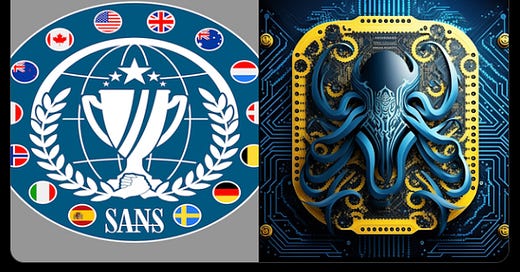Monthly Rewire - July 2024
Wiring you into the Canadian cyber defence stories I'm following this month
July has not been any quieter as it has been plagued with the ongoing fallout associated with the Snowflake-related breaches. The major global Microsoft outage caused by Crowdstrike remains often discussed and is likely to lead to investigations by the US government.
NATO Backs Effort to Save Internet by Rerouting to Space in Event of Subsea Attacks
In 1858, the first transatlantic communications took place via undersea telegraph cables. More than 150 years later, the undersea cables used for international data flows use fiber optics as well as a host of other advanced materials technology to sustain global data transfer. However, despite these advancements in how this approach is used, the general approach methodology to undersea cables to sustain international communication remains the same. There are many efforts to move beyond this, including through the increased use of satellites which NATO has now provided financial backing.
NATO’s Science for Peace and Security provided a $433.6K grant to a group of researchers looking to develop a way to seamlessly reroute internet traffic from subsea cables to satellites in the event of sabotage of natural disaster. While this is presently viewed as a backup, this should be viewed as a stepping stone to greater redundancy in the system or a general transition to greater use of satellites.
Readers may recall that in the leadup to Russia’s invasion of Ukraine in 2022, undersea cables were repeatedly cut in Northern European seas. In addition, concern has been growing over Russia and China’s ability to conduct espionage via tampering with the undersea cables. Presently security around satellites is extremely poor, but this something that can be quickly rectified to provide an alternative to undersea cables.
Multiple nations enact mysterious export controls on quantum computers
Western countries over the last few months have steadily been adopting new regulations and export limitations on quantum computers containing more than 34 qubits and error rates below certain controlled threshold. It is believed that this is meant to slow the development outside of these Western countries, but countries have been so quiet about the reason for these regulations that it creates more questions than answers.
Canada was one of these countries to move forward with these regulations, which added nearly identical wording as other countries in its May 31 Canada Gazette. To date, countries who have also adopted similar restrictions are the United Kingdom, France, Netherlands, and Spain. More are expected to adopt the same restrictions.
I have long said that the best uses for quantum computers is for academics to write articles. However, that appears to finally be changing as quantum computers are steadily getting closer to being able to break encryption. Although this has been known for some time, the reality is getting more clear and countries are quickly moving to adopt quantum-proof encryption as a result. Quantum computers at the moment have few uses right now, but these new export restrictions may indicate that their utility may be at a tipping point. Although this does not mean we will have quantum desktop computers, on the contrary quantum computers will remain very niche, for specific purposes as quantum computing currently is not as efficient in the vast majority of things compared to classical computers.
NATO agrees to building of new cyber defense center
NATO announced the establishment of the NATO Integrated Cyber Defence Centre (NICC). This new center will be located at the Supreme Headquarters Allied Powers Europe (SHAPE) in Belgium and aims to enhance the protection of NATO and Allied networks and manage cyberspace as an operational domain. Broadly speaking, the NICC will seek to coordinate cyber defense between allies. This can broadly be viewed as a development upon NATO-wide cyber defense capabilities that have been slowly improving over the last decade.
These developments should not be overlooked as the previous Warsaw Declaration directly influenced Canada to develop its military offensive cyber capabilities.
A Royal Canadian Navy team won the prestigious SANS Netwars International Services Cup
According to the RCN’s Twitter and LinkedIn, a five-person team won the SANS Institute Netwars International Services Cup, outperforming, a 5-person team won the SANS Institute Netwars International Services Cup where they outperformed 35 other teams from 8 different countries.
“8,400 hackers in North Korea… “Joint development of malware with Russia”
North Korea has become one of the most prolific and hostile cyber threat actors, and new research indicates they’re now working with Russia. North Korea has found considerable success in using cyber operations to get around sanctions and accumulate cryptocurrency. This has been so successful that North Korea provides massive benefits and advantages for individuals who pursue and are successful in this field. Their skills and success are now recognized by allied states who seek to capitalize upon this. This partnership will only make the world more dangerous.





